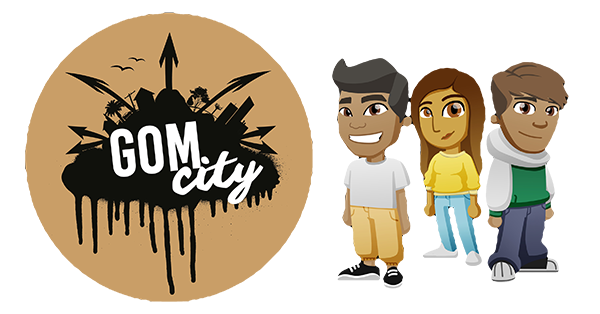
The launch was the culmination of seven months of hard work by project manager Eleanor Goodbourn and the focus group of people who were, or who had recently been, in state care.
‘The need for a project like this had been discussed long before I arrived in April,’ she said.
‘Relationships Australia SA has been providing post care support services for a long time now but were aware that there were some young people who were not accessing service in the current form.
‘Was there a way to support and assist young people who did not access services? In particular, we thought about those who had left care and suddenly found themselves isolated and lacking some of the basic skills you need to get along living on your own.
‘We ran an online survey, testing some ideas about a website and brought the results back to our focus group. The idea of a game app. caught the imagination of the focus group right away and that became the germ of GOM City.
GOM City
‘Mighty Kingdom, who are a locally-based but internationally known game developer came on board for the game app. It was their first venture into social learning games and they were very enthusiastic.
‘Playing the GOM City game teaches some basic skills like budgeting, remembering important events and managing a household. But the current form of the game could be only the beginning. There is huge potential in the framework of the game to add in other levels to incorporate other skills.
‘We have made sure that the skills taught in the game align with the Australian Core Skills Framework so those skills can be formally recognised in other domains. We will be looking for funds to develop this aspect further in the future.
‘You can download the app. free at the iOS App Store or from Google play.
GOM Central
‘The GOM Central website is for all young people in care or who have been in care. We’ve got a lot of information and links that they can dip into any time when they need it. We also have a number of videos featuring young people with stories about their time in care, letting them know that they are not alone and they have experiences in common with others. They also share advice and information. One of things we learned in focus groups is how important peer to peer learning is with this group of people.
‘The site also hosts a blog which offers visitors the opportunity to share experiences and knowledge.
‘The young people who have been on this journey with us are the real heroes. They generously shared their ideas and experiences and trialled the games – and you may see some of them on the videos!’

One Response
We could learn so much more by looking at the comments etc by children and young people in care as well as the older people who are out of care and their experiences and advice to us which we often dismiss or are too busy to look into more deeply.
Having said this I know that there are many workers who are committed to making life better for the children in care.
Unfortunatly case management these days relies on so many systems which are set up to work with economic rationalism in mind.
Whilst not minising the strength of case work within case management by some workers,I would love to see more actual case work with these young people which is not so tied to economic rationalism and systems within that economic framework. I am not suggesting that we can free ourselves from any restrictions such as financial but I am suggesting that there must be a return to basic Social Work 101 where we can work at the client’s level without filling up our time with filling in numerous forms to satisfy budgetary obligations and KPI s this time could be better spent with the client.and the evidence would be in client outcomes.